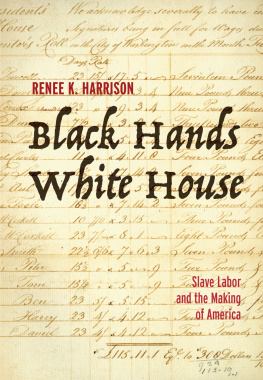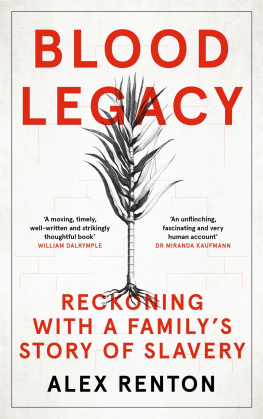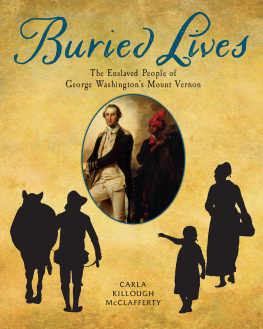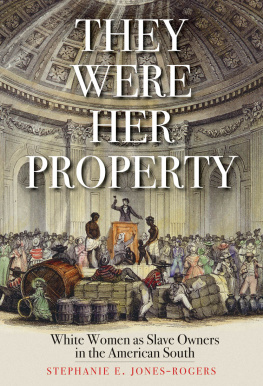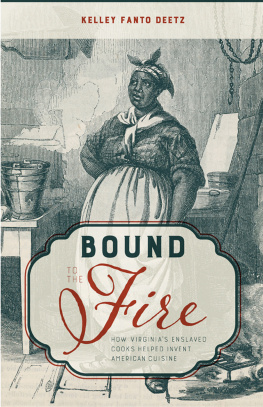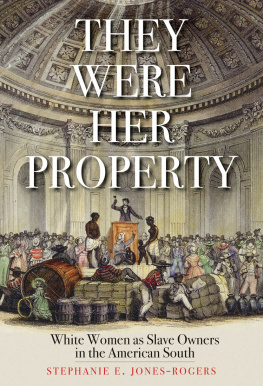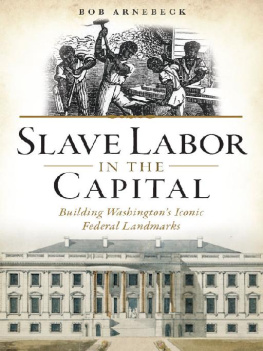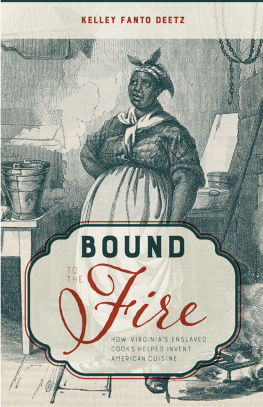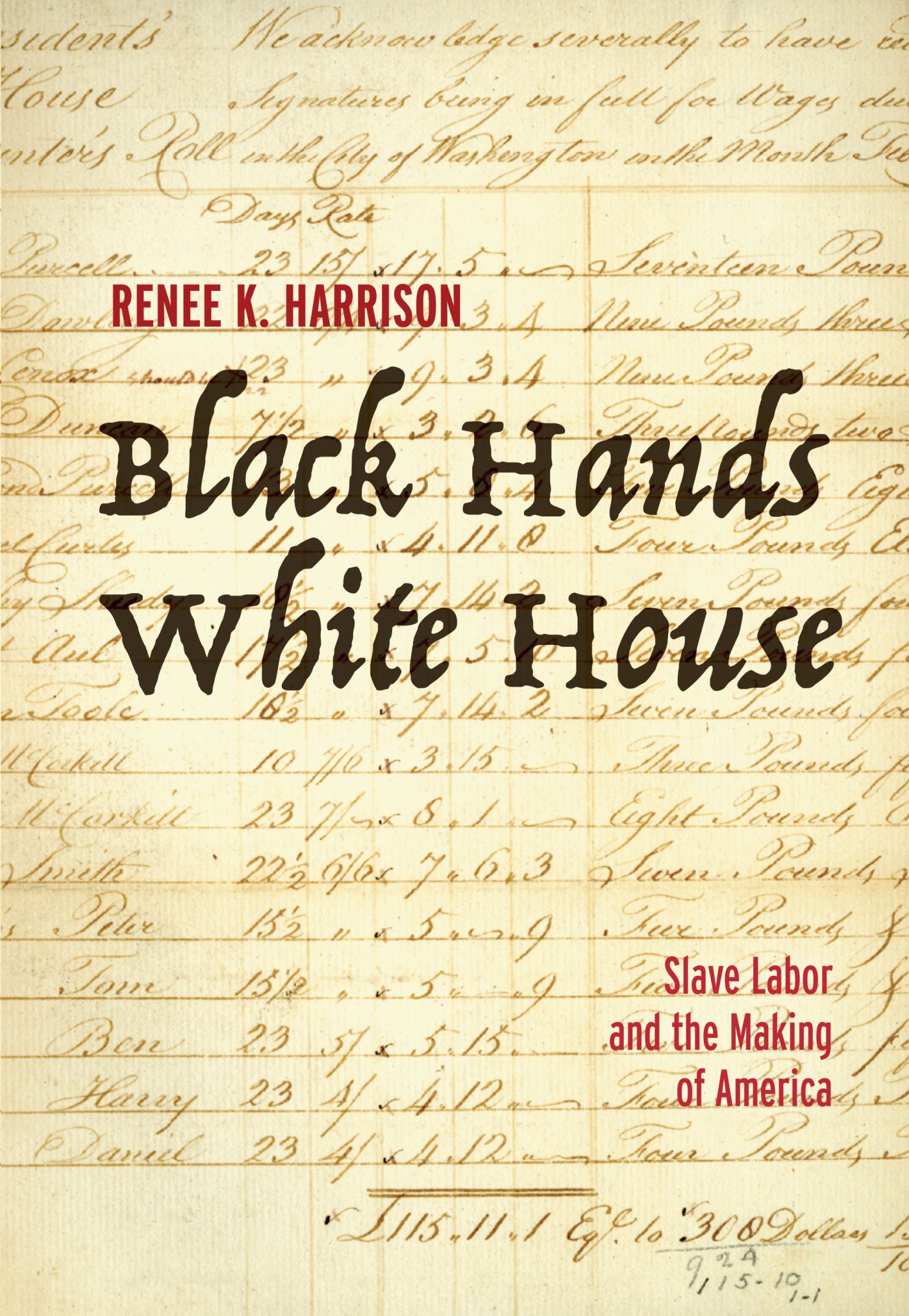
Black Hands, White House
Black Hands, White House
Slave Labor and the Making of America
Renee K. Harrison
Fortress Press
Minneapolis
BLACK HANDS, WHITE HOUSE
Slave Labor and the Making of America
Copyright 2021 Renee K. Harrison. Printed by Fortress Press, an imprint of 1517 Media. All rights reserved. Except for brief quotations in critical articles or reviews, no part of this book may be reproduced in any manner without prior written permission from the publisher. Email or write to Permissions, Fortress Press, PO Box 1209, Minneapolis, MN 55440-1209.
Cover image: Monthly Payroll for Carpenters and Joiners at the Presidents House, February 1795. National Archives, Records of the Commissioners of the City of Washington
Cover design: Savanah Landerholm
Print ISBN: 978-1-5064-7467-0
eBook ISBN: 978-1-5064-7468-7
While the author and 1517 Media have confirmed that all references to website addresses (URLs) were accurate at the time of writing, URLs may have expired or changed since the manuscript was prepared.
The bent backs straightened up. Old and young who were called slaves and could fly joined hands.... They rose on the air. They flew in a flock that was black against the heavenly blue. Black crows or Black shadows. It didnt matter, they went so high. Way above the plantation, way over the slavery land. Say they flew away to Free-dom.... They say that the children of the ones who could not fly told their children. And now,... I have told it to you.
Virginia Hamilton, The People Could Fly
To Christopher,
for inspiring me to turn my lament into a manuscript;
to Ron and Nick,
for in your garden, this work has blossomed;
and to the Ancestors,
for which no monument rests on the National Mall
Contents
Black Hands, White House is a labor of ancestral love birthed into wholeness with the care of all the following conversation partners and supportive communities.
Sincere thanks to my colleagues who perfected this work: Veronice Miles: you nurtured this manuscript as though it was your own. Your support, collaborating spirit, and editorial discernment were invaluable. Ronald Hopson, my colleague and brother: your intellect, constructive feedback, and critical perspective sharpened this work. Yolanda Pierce: our soul talks and sisterhood and your life-giving prayers fueled me and this manuscript to completion. Angela D. Sims: our ancestral musings and sojourn into the horrid shepherded the contours and delivery of this work#uralwaysrightontime. Velma E. Love: our sisterhood and ancestral journeying together have always been my soul comfort and compass. Pamela R. Lightsey: your advocacy for LGBTQIA+ persons is a reminder of why we must make visible the stories of those invisibilized. Stephanie Sears: our friendship and creative brainstorming inspired the creativity in this work. Allezo Nevell Owens: your well of support, edits, and friendship never runs dry.
Baba Awo Falokun Fasegun: thank you for your spiritual guidance and reading me home.. Riggins R. Earl Jr., my mentor, gadfly, and Brer Rabbit voice in my head: you have shaped and nurtured my mind and soul and provided me the tools to deconstruct the past with reverence to enslaved people. Amanda Hendler-Voss and Meg Maguire: may you continuously feel the blessings of those who labored because of your faithfulness to erect a national monument in their honor. Jennie S. Knight: your support with research at Monticello and the University of Virginia helped inform this work. Andrew McBride: our moments at the gate inspired chapter 7 and will stay with me for a lifetime. Michelle Vanheuckelom: our friendship and conversations over tea in Belgium helped me think clearer about the necessity of this work. Heartfelt thanks to my editor at Fortress Press, Carey C. Newman, a gem of a human being, the midwife of this work, and the master of metaphors. I am also grateful to Ulrike Guthrie, my editor who has carried my voice and work over the years. Equal gratitude to Richard Brown, director of the University of South Carolina Press, for initially seeing the potential of this work. Black Hands, White House is due in part to my Howard University School of Divinity (HUSD) graduate research assistants over the years: Cleon Huff, Crystal West, Rashid Hughes, David Belton II, and Nicole Marie Melton. I am profoundly impacted by my students at various institutions, past and present, especially those doctoral students in the history department at Howard who captivate my imagination, fuel my intellect, and nourish my soul.
There is no adequate language to articulate my mom and dads love and support. Lloyd Preston Harrison Sr. (19242001), whose spirit lives with me daily, and my mom, Mary June Hamilton Harrison, my best friend and greatest inspiration (thank you, Mom, for listening to portions of my manuscript): I pray I have represented you both well. Warm thanks to family members who aided this project: Tiombe Wise, Natasha Hemmings, Linda Hemmings, Parlett Harrison, Thelonious Wise, and Amber Wise. Elaine Womack, my mom and the author who gets me without me uttering a word. And to Garrett Imahn Kynard, my godson, and Quiana Lewis Wallace and Marcia Cia Price, my mentees, for always challenging me to create, write, and live authentically.
Yolonda (YR) Summons, my love, my spouse, and North Star whose presence and itutu (coolness) stills me. Your insights streamlined this work, and your writing retreats carried me to publication. And to Satchmo, our pup: you are my most joyous melody. Finally, to the ancestors, my muse, my breath, and raison dtre: Le egun a se de, and I pray I have represented you well. .
Black Voices Calling
The Vibrations, the Shoes, and the Native Son
I got shoes, you got shoes
All o Gods chillun got shoes
When I get to heabn Im goin to put on my shoes
Im goin to walk all ovah Gods Heabn
I got-a wings, you got-a wings
All o Gods chillun got-a wings
When I get to heabn Im goin to put on my wings
Im goin to fly all ovah Gods Heabn
Negro spiritual, All Gods Chillun Got Wings
In summer 2010, I arrived in the nations capital and stood in the Yard of the university that I had dreamed of attending as a young teen. Decades earlier, my fathers heart attack derailed my plans, causing me to stay closer to home and enroll in a local university in the San Fernando Valley, thirty miles from my childhood home in southern Los Angeles. Now the place I dreamed of attending as a student became the place I would later serve as an associate professor, The Mecca: Howard University in Washington, DC. My arrival in the nations capital was filled with enthusiasm and hope. After all, America had elected its first Black president. I held no illusions that the election of the forty-fourth US president, Barack Hussein Obama, and the presence of the First Black Family in the house that enslaved laborers built would resolve racism in America. As James Baldwin describes, I have come to know, witness, and experience an America that is more violent than democratic toward Black, Indigenous, and other disenfranchised peoples.
My initial introduction to the city was marked by openness, hospitality, and kindness. Dr. Ron Hopson, a psychology professor at Howard and interim academic dean in the School of Divinity at the time, and his partner, Nicholas Manning, invited me to stay at their home while securing housing. A couple of weeks turned into five months filled with the aroma of Nicks cooking and the joy of their ethnically and socially diverse DC dinner parties, along with quiet moments with Lincoln, their pup. My Saturday morning ritual included bookstore browsing, museum visits, and walks to the National Mall just minutes away from their home.

